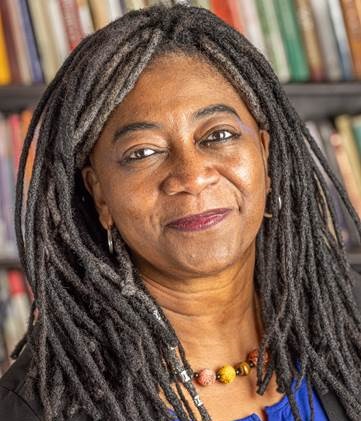2021
Kamari Maxine Clarke
Socio-Legal scholar and anthropologist pushes boundaries and strives for social change

2021
Socio-Legal scholar and anthropologist pushes boundaries and strives for social change

For more than two decades, legal scholar and political anthropologist Dr. Kamari Maxine Clarke has been focused on issues related to legal institutions, human rights and international law, religious nationalism, and the politics of race and globalization. The distinguished professor at the University of Toronto is a 2021 winner of the Guggenheim Fellowship – an accomplishment of which she is rightfully proud.
“It is something that I don’t take lightly, particularly knowing that The Guggenheim fellowship is highly competitive and coveted, but also that very few Guggenheim Fellowships in this category have been awarded to Black women,” she says.
“Endowments such as this one will enable me to push the boundaries by engaging in research that involves grassroots social thought and intellectual mobilizations.”
Dr. Clarke explores theoretical questions around culture and power, and the relationship between new social formations and contemporary problems. One of her many academic contributions is in demonstrating ethnographically the ways that legal, scientific and religious knowledge regimes produce practices that travel globally.
Dr. Clarke is the author of three books and co-editor of an additional six. She is currently completing another book on how social movements in the Global South (Nigeria and Mexico) use new technologies – such as geospatial technologies, artificial intelligence, mobile phones and GPS – to challenge the way that justice has been traditionally accessed and delivered.
Her work shows how while these technologies have offered beacons of hope, they also bring with them a set of challenges having to do with the bias written into their operating logic. She demonstrates how highly visible data related to certain kinds of violence can be less easily captured by these technologies but others obscured from view. Dr. Clarke calls on scholars to examine the way that this bias inadvertently extends (neo)colonial dynamics that have historically given greater power to White people rather than racialized people, to Northern Western science rather than other knowledge systems and, in the context of violence in the Global South, to propertied and settled communities than to nomadic communities.
“I am working on a project involving early warning early responses in contexts of violence and am engaged in grassroots strategies around political solutions. The award has made it possible for me to position my research and writing as a vehicle for social change.”
In addition to her scholarly work, Professor Clarke has served as a technical advisor to the African Union (AU) legal counsel and produced policy reports to help the AU navigate various international law and United Nations challenges. She also continues to consult in different capacities with the Canada’s Global Affairs and the U.S. State Department’s Bureau of Conflict and Stabilization Operations.